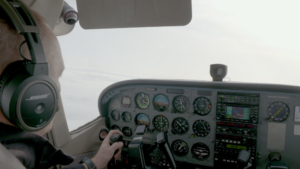Transitioning to IFR flying with an Instrument Rating
|
Getting your Trinity Audio player ready...
|

An Instrument Rating will provide more freedom, confidence, and utility for your Private Pilot certificate as you no longer limited to VFR conditions. Not only will you have the skills and confidence for flying in more diverse weather conditions, and solely by reference to instruments, but instrument flying will introduce more precise flying and enhanced utilization of ATC services which can equate to safer flying.
Steps to Earning an Instrument Rating
1) Ensure Eligibility
Instrument Rating eligibility is outlined in 14 CFR 61.65. A person who applies for an instrument rating must:
- Hold at least a current private pilot certificate
- Be able to read, speak, write, and understand the English language.
 2) Complete your ground school & written test
2) Complete your ground school & written test
Instrument rating applicants are required to receive and log ground training from an instructor or complete a home-study course of training on the required aeronautical knowledge areas. Sporty’s online Instrument Rating Course will help you ace your FAA written test, save money during flight training, and become a better pilot. Over 12 hours of HD video and animations explain everything you need to know to earn your Instrument Rating and feel confident in the clouds. Combine that with powerful test prep tools, a comprehensive document library, interactive exercises, and convenient app options, and you have aviation’s most complete training course.
 3) Complete your IFR flight training
3) Complete your IFR flight training
To be eligible for the checkride, applicants must have logged the required aeronautical experience which includes:
- 50 hours of cross-country as PIC (at least 10 hours in an airplane)
- 40 hours of instrument time (simulated or actual) to include 15 hours of instruction
Areas of IFR training include preflight preparation, clearances, basic attitude instrument flying, navigation, emergency operations and post flight procedures. Sporty’s Flight Training Central offers a flight school directory to help you identify a flight school and instructor for your IFR training.
 4) Complete your practical test (checkride)
4) Complete your practical test (checkride)
After you’ve completed the requirements above, you’ll be ready for your instructor to provide an endorsement for your IFR checkride. You should enlist the assistance of your instructor or flight school in scheduling the exam. Familiarize yourself with the Airman Certification Standards (ACS) for the Instrument Rating – the guide the examiner will use for your evaluation. Ensure your Instrument Rating application (8710) is completed and signed within IACRA. Complete any necessary preflight planning such as an aircraft weight and balance or IFR flight plan.
Sporty’s Instrument Rating Course also provides a dedicated checkride prep module with oral exam flashcards, helpful tips, an interactive checklist, and the current ACS.
Best wishes in your IFR training!
- What would you have done? - July 26, 2024
- Accelerated Stalls: Sporty’s Flight Maneuver Spotlight - July 22, 2024
- EAA AirVenture Oshkosh 2024 Starts Monday - July 19, 2024


